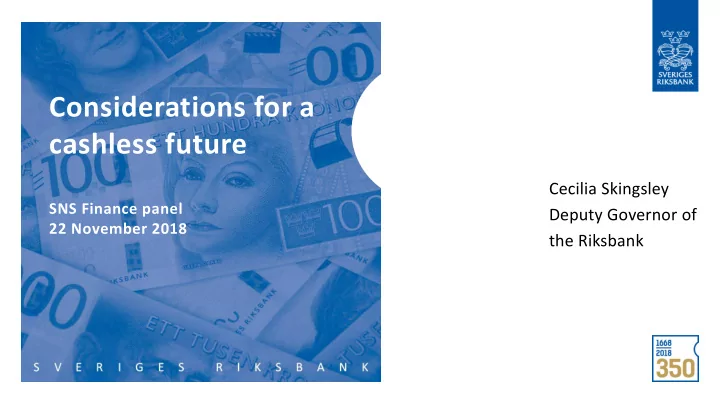

Considerations for a cashless future Cecilia Skingsley SNS Finance panel Deputy Governor of 22 November 2018 the Riksbank
What this speech is about • The Riksbank's role on the payment market • The e-krona project: The way forward in a Sweden where cash no longer works • The alternative to issuing an e-krona: a privatised payment market • The payment market's characteristics and why the state needs to regulate and oversee • The Riksbank is developing solutions, but Sweden’s choice will be made by legislators
Professor Pontus Fahlbeck, anno 1900: “To “To no now re replac lace this s ord rder w r wit ith a bank a bankno note mon onopol opoly wou ould be e to to int interru rrupt an an org rgani anic dev evel elopm opment whi hich cle learl rly ag agre rees s well w ll wit ith our ur ent ntire ire econo nomic li life, suc such as as it it has as be been n fo forme rmed sinc since a a hund undre red ye years ars ag ago.”
The payment market is changing – with or without an e-krona Financial RIX infrastructure Banks & financial institutions
Swish is now as common as cash payments Percent Cash Card Swish The figure shows responses to the question: Which means of payment have you used in the past month? Source: The Riksbank
Should the Riksbank issue e-krona? “Sweden is one of the first to phase “For example, this out the use of a could, according to 350-year old Skingsley, happen method of paying.” through a cash card connected to an account in the Riksbank or through a payment app.” Source: SvD, 16 Nov 2016.
Conclusions from work on the e-krona • Can be developed with existing technology • Can be designed so that the consequences for monetary policy and financial stability will be limited • Legal support for value-based e-krona
Increasing numbers of shops are cash-free
It will probably be hard to stop the trend towards reduced cash usage New technology and New consumption patterns Obligation to accept cash innovation can be waived
Digitalisation affects everyone – central bank digital currencies are being analysed in many countries “In circumstances where the traditional approach to the provision ”I believe we should consider the possibility of central bank money – to issue digital currency. There may be in physical form to the general public a role for the state to supply money to and in digital form to banks – the digital economy” was altered by the disappearance of cash, Christine Lagarde, 2018 the provision of CBDC could bring substantial benefits” BIS, 2018
The payment structure – a natural monopoly • Double infrastructure is inefficient • Leads to one dominant company • If unregulated, excessive prices can be charged, competition & innovation can be hindered • Cash has acted as a disciplining alternative
Payment infrastructure – complicated to steer so that social needs are satisfied High entrance Important to ensure barriers accessibility and protection against Few actors on the shocks supply side Safeguard competition Economies of scale and promote the private sector’s High network innovative capacity effects
Offline: Ability to pay are governed by the international card networks Transfer charge Card Card issuer acquirer Card Agreement Agreement network Payee Payer Card payment
Next step in the work on the e-krona Proposals for E-krona pilot Continued analysis & legislative amendments dialogue with authorities
Possible e-krona system
Money has been adjusted to technology and needs throughout history Private electronic money Private money Government electronic Government money Government currency currency ?
Recommend
More recommend